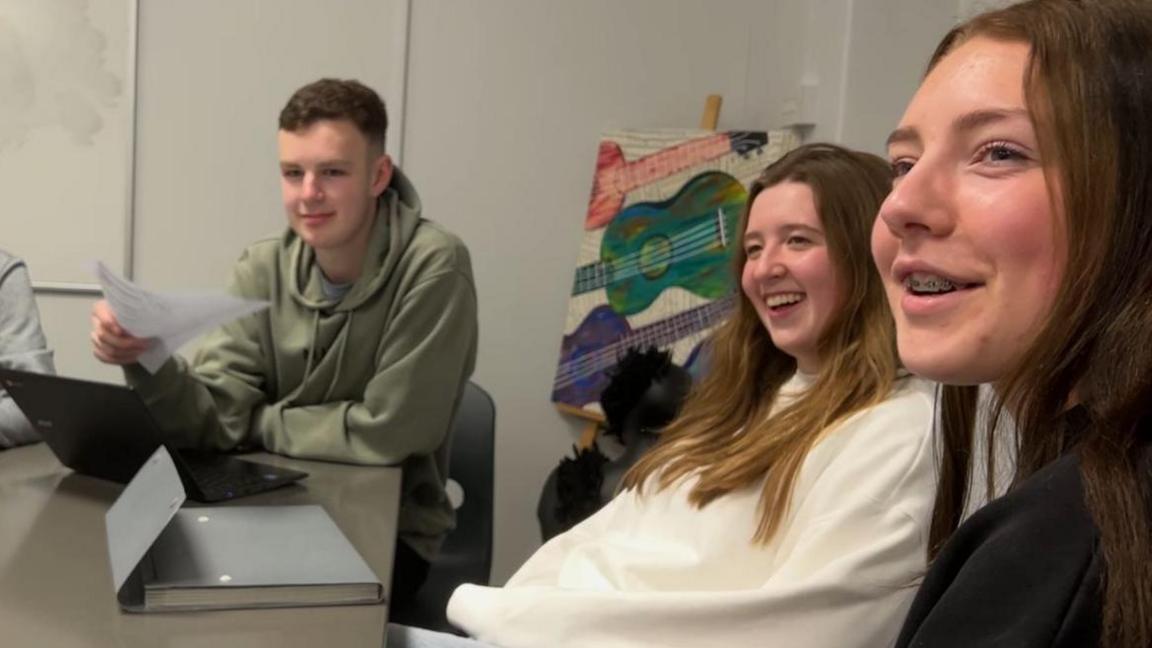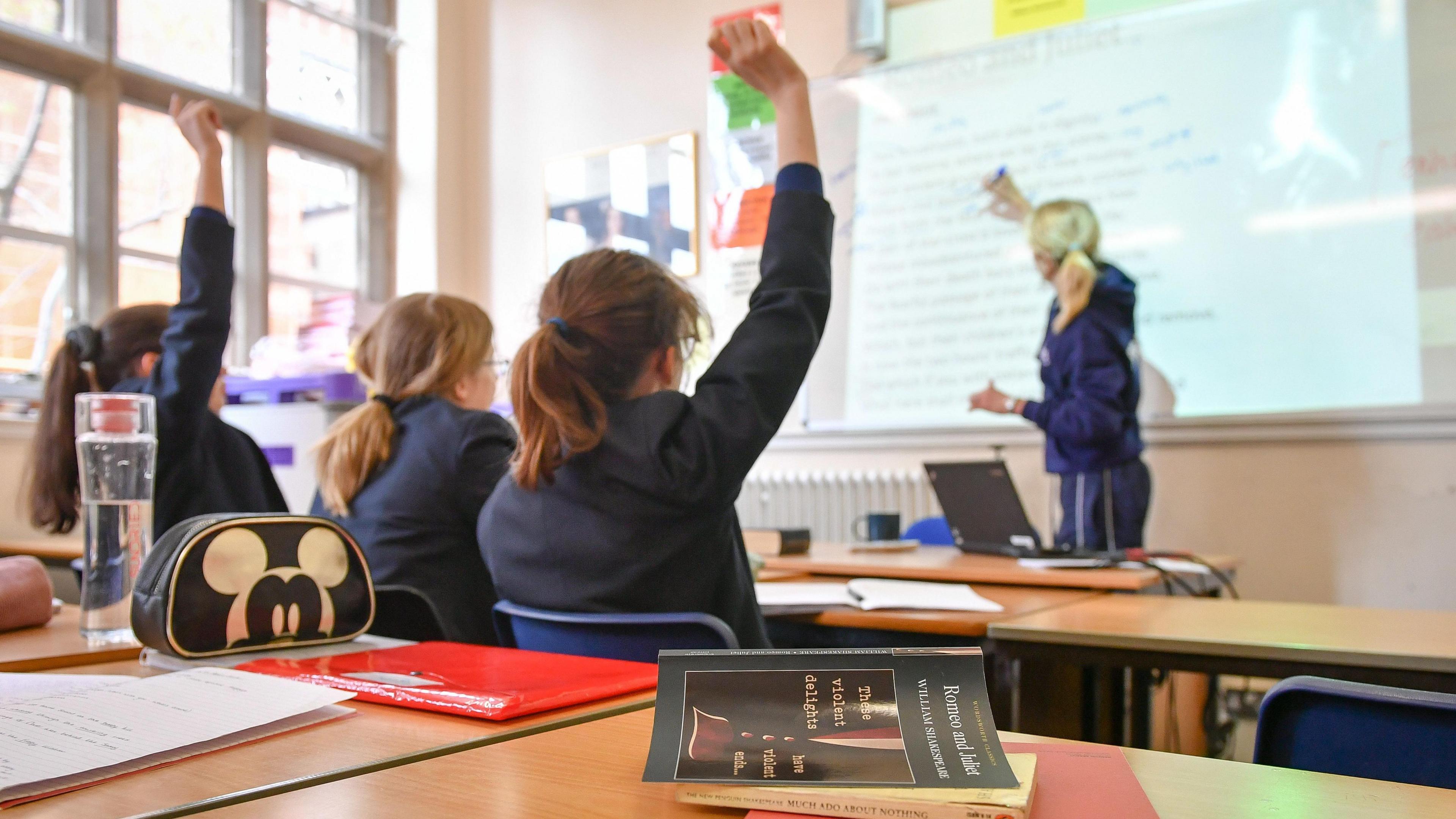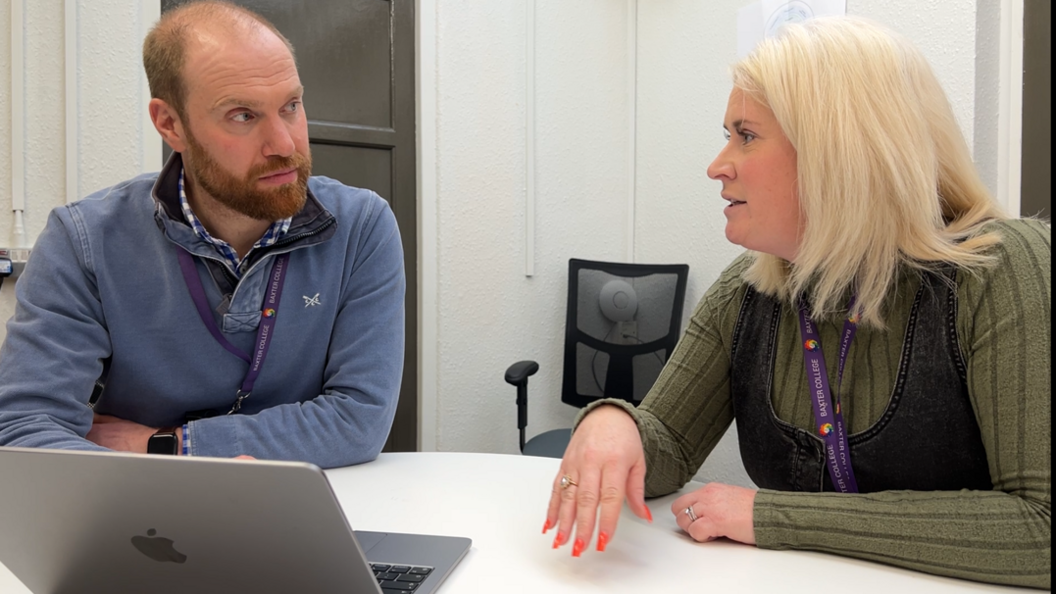Pupils blame absence on routine shattered by Covid

Tom, Katie and Tegan give their views on why students are persistently absent from school
- Published
The Covid-19 pandemic has undermined the daily habit of attending school, according to secondary school students in a county where nearly 25% have been persistently absent this academic year.
Teenagers in Worcestershire told the BBC Politics Midlands programme that home study during lockdown, and increased stress, had left many struggling to cope with school routine.
The council said it continued to work to support pupils and parents and "remove any barriers" preventing attendance.
Overall attendance in the autumn had been up on last year, the authority added.
At Baxter College in Kidderminster, where there are 900 students, the overall attendance rate remains 4% down on pre-pandemic levels, according to the principal.
One pupil there said students were struggling to readjust after the absence enforced by Covid, with one day off easily stretching into more now things were back to normal.
“At the start of the week people say ‘oh I’ll just miss the one day’," explained Tom, 18, a sixth form student.
"And then we get to Friday and people are like ‘I’ll have a long weekend'.”
Tom said he believed home study during lockdowns made many unused to school routine.
“Now suddenly everyone’s being told what to do, when you can eat, when you can go home - it’s definitely been a shock," he told the programme.
Fellow student Katie, 17, added: “School got re-introduced and I felt like people couldn’t be bothered to come back in, because they felt 'if I can do this at home, surely there’s no need'.”
Another 17-year-old, Tegan, said: “My attendance has definitely dropped. I feel like I personally don’t mind working from home, and I work better in the evenings."

The number of pupils persistently absent from school in Worcestershire has not returned to pre-pandemic levels
Principal Mat Carpenter said the drop-off was more marked in students on free school meals.
Attendance was “not just a school problem", he said, but a matter for support services and parents too.
Additionally, the number of pupils missing more than half of school has risen sharply at Baxter College.
“Where previously we would have one or two [pupils like that] in the whole school… we’re now looking at up to 6%,” Mr Carpenter said.
Baxter College is not unique in the county.
With a secondary school population of more than 36,000, an estimated 23.9% - 8,650 students - in Worcestershire have missed at least 10% of school days so far this academic year.

Baxter's principal, Mat Carpenter, and the school's wellbeing lead, Stacey Hannan, said schools needed more support to raise attendance
Baxter’s wellbeing lead Stacey Hannan - who is leading efforts to build relationships with families - admitted progress could be slow.
“It could take six to eight weeks of home visits, telephone conversations with parents, and meetings,” she explained.
She said the long referral waits students faced for mental health support or neurodiversity assessments meant that often schools were limited in the help they could give.
“I think the system in both of those areas is creaking”, added Mr Carpenter, calling for substantial investment.

Keira, 15, praised the pastoral care offered at Kidderminster & District Youth Trust, and said she did not feel like she was being judged as in school
For 15-year-old Keira, who is not currently in mainstream education, “mental health is the main issue" for being an absentee, along with a lack of support for such challenges.
“I started to not go in as often… my mum kept pulling me out because of how bad I was getting," she said of her experience.
After being referred to Kidderminster & District Youth Trust, she now has a weekly meeting with mentor Maisie Cook, who says she offers an "open space" for teenagers to talk about their emotions and education.
Speaking generally, Ms Cook said: "We see a lot of young people who have a lot going on behind closed doors. Covid has been massive."

Former Schools minister Robin Walker MP said more investment was needed for a rising level of neurodiverse students
Last year, a cross-party group of MPs called for the government to offer better support for pupils and schools.
“I think I’d give them an A for effort, but they’re not there on achievement yet,” said Worcester's Conservative MP Robin Walker, chair of the House of Commons Education Select Committee.
Tracey Onslow, cabinet member for education at Worcestershire County Council, said: "We continue to work closely with education settings across the county to support pupils and parents, and where possible, remove any barriers preventing regular attendance."
Herefordshire and Worcestershire Health and Care Trust said it was working with schools and said it carried out weekly reviews of absent children.
It added it worked to identify health concerns that may lead or contribute to school absence.
Follow BBC West Midlands on Facebook, external, X, external and Instagram, external. Send your story ideas to: newsonline.westmidlands@bbc.co.uk, external
- Published3 September 2023

- Published16 May 2023

- Published7 March 2023

- Published28 January 2024
